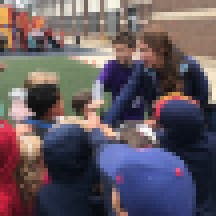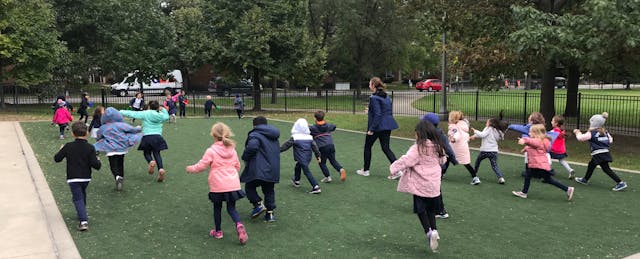CHICAGO — At first glance, it looks like your standard recess: Elementary school students, bundled up in warm jackets, hats and mittens, laugh and play outside on a crisp, cloudy fall day in the Windy City. Some are climbing on the playground equipment, others are taking part in a soccer scrimmage and the rest are playing a game similar to tag.
But upon closer inspection, what is happening outside during recess at Eliza Chappell Elementary School, part of Chicago Public Schools, is in fact rather unusual. Every student is occupied with one activity or another—even those on the jungle gym. The games are clear, organized and inclusive. And a specially trained coach is in the thick of it, orchestrating it all.
This scene is the result of a national, coordinated program to provide safe, structured play to students and, in effect, instill in them foundational social-emotional skills such as conflict resolution, fairness, leadership and communication. In short, they’re learning good sportsmanship, and that in turn has made a dramatic difference in the way students treat each other. But can resolving the broad range of elementary school conflicts be as simple as learning to play fair? For Chappell, the answer might just be yes.

Located on Chicago’s north side, Chappell serves approximately 680 preK-8 students from the nearby Ravenswood and Bowmanville neighborhoods. Until a few years ago, the school, like others in the district, didn’t have any dedicated time for recess. But that all changed in 2012, when then-mayor Rahm Emanuel extended the length of the school day and made recess mandatory for schools in the nation’s third-largest district.
Joseph Peila, who has served as Chappell’s principal since 2007, did not exactly welcome that news. Peila had previously worked in suburban and urban districts that held recess and recalled it as “one of the more complicated times of the day,” he says.
That’s because most schools open the doors to the playground and send the students out for a period of free play, absent any boundaries, instructions or expressed purpose, Peila explains. And a half-hour later, when the students file back into the building, they bring with them all the tension and conflict that arose outside.
“I’d spend the next two hours after recess solving all the problems that kids were having,” Peila says of his former schools. “I said, ‘There's got to be a better way to do this.’”
The solution came via Playworks, a nonprofit that partners with elementary schools to promote safe, engaged play during recess and, by extension, simultaneously improve children’s physical health and social-emotional well being.
“Play is not just a fun activity kids happen to do,” says Elizabeth Cushing, president of Playworks. “It’s a developmentally critical behavior through which kids learn.”
Research from the National Academies of Science, Engineering and Medicine shows that physical activity can have academic benefits, stimulating kids’ cognitive development and improving their learning outcomes. Other studies indicate that through playing together, children build stronger social-emotional skills, setting them up for greater success in their adult lives.
Playworks was founded in 1996 to help schools in the San Francisco Bay Area rethink recess, based on what that research suggests. The nonprofit began to scale its model nationally in 2004.
The original “on-site coaching” model developed by Playworks—which is used at Chappell and in over 220 schools across the country—involves embedding a full-time coach in a school for an entire year. But the organization now also offers some less resource-intensive services, such as a training program that can be delivered either in person or online, and a part-time consultative service that allows one coach to work with four schools in a year, spending one week per month at each site. All together, the services reach 2,500 U.S. schools.
Chappell has had a full-time Playworks coach on staff since 2012, with a new coach rotating in each year. Schools with on-site coaches typically cover about half their salaries, and Playworks handles the rest, according to Cushing. The coaching service can cost each school up to $65,000 to implement, but Playworks offers up to 50 percent discounts to schools with majority low-income populations. Coaches are Americorps members that receive training from Playworks staff and tend to be young adults in their 20s—often fresh out of college or fairly new to the workforce, she adds.
During the two-week training, coaches learn about various games, recess culture, youth development and principles of play, such as consistency and conflict resolution. They learn how to model good behavior and how to explain the rules of the games they learn to different ages. They also pick up some useful “attention-getters” and “ice breakers” for recess, says Stephanie Ovitt, an Americorps member serving as Chappell’s full-time Playworks coach this year.
Perhaps most importantly, the coaches learn about Roshambo, a game more commonly known as “Rock, Paper, Scissors.” It’s a simple but effective tool to solve conflicts, staff say.
“If you’re actually trying to resolve the argument to see if the ball was on the line, you’ll never resolve it,” explains Cushing. But with Roshambo, “everyone saves face. It’s fast. The game keeps going. That tool of conflict resolution is very important.”
Roshambo isn’t a strategy reserved for recess—not at Chappell, anyway. Margot Taylor, the school’s bilingual coordinator, says she has seen students from first through eighth grade use Roshambo at the water fountain to decide who gets to drink from it first. She’s seen middle schoolers use it when two kids want to check out the same library book.
“It’s absolutely incredible,” says Taylor, who works with Chappell’s English language learners—about 20 percent of the student body. “The fact that what could turn into a dramatic and crazy moment that would then bleed over into the rest of the academic day is done and over and then we move on with our lives—I think that’s very, very important. It’s an important skill for people in general to learn, but certainly children from about 10 to 14.”
On the playground later that day, when a group of students lined up for the “cool down” at the end of recess, two boys used Roshambo to determine who got to stand first in line. The boy who lost took his place behind the other without any objection or hesitation.
As the kids get older and their conflicts become more complex, Roshambo may become less relevant, Taylor acknowledges. But the hope is that they’ll be better equipped to recognize when something is serious and when it’s inconsequential. “I think they will have a bit more resilience,” she says, perhaps in part thanks to the games they play.
In general, Chappell students handle conflict well, says Peila, the principal. And they have a better time mitigating or outright avoiding it than students at his previous schools did.
“We're not seeing the problems ... because the kids are resolving them outside, or they're engaged and they're not having them to begin with,” Peila notes. “They're making good decisions about what to do and how to solve the problems that come up naturally.”
In addition to recess, which is held for 20 minutes before or after lunch for every class every day, students participate in a structured activity known as Class Game Time once a week.
During Class Game Time, Ovitt introduces the students to new games—such as Cookie Jar for kindergarteners and Sharks and Minnows for second graders, both of which help students work on their active listening skills and, in practice, function like variations of tag. Ovitt reviews the rules, shows them how to play and guides them through any conflicts that arise in the game while illustrating good sportsmanship. “Really, it’s a time for instruction and team building within the group,” Peila says.

This is also an opportunity for Ovitt to talk through some of the challenges of recess with students—particularly the younger ones. For example, if students are having a hard time admitting when they got tagged or got out in a game, she addresses that with them.
“We reassure them: ‘It's OK if you make a mistake. It's okay to be tagged. That's part of the game. You will have lots of opportunities to play,’” Ovitt explains. The goal is to build up students’ resilience so they understand they don’t always have to win—and they don’t always have to be right. “That’s something we’ve been working on.”
Students also learn how to put those lessons into practice so that when someone makes a mistake at Chappell, they don’t scream “You’re out!” They give that person a high five or a pat on the back and say, “Good job!” or “Nice try!”
With fewer students than are present during recess, Ovitt is able to handle the Class Game Time on her own. But at recess, support staff help supervise the students at play, and junior coaches—fourth and fifth grade students who have applied and been selected as a sort of peer leaders—help lead the game of the week. At the time, it was “sneak,” a favorite among the students that is akin to capture the flag.

Junior coaches work alongside Ovitt, stopping and starting games, determining who is still playing and occasionally creating new games to share.
“The Playworks coach tries to be really purposeful talking with the classroom teachers to identify students who either already are showing leadership skills or could really stand to gain some leadership skills,” explains Taylor. “It's kind of this mix of students who would default to leadership, and students who maybe wouldn't have that opportunity otherwise.”
Taylor adds: “Kids who maybe don't have a history of being the most successful in school take great pride in being a junior coach.”
Ovitt will coach at Chappell through the end of the 2019-2020 school year. She has a few goals for what she hopes the students will learn from her and what they take away during that time—none of which have to do with games or rules.
“I hope that they feel more comfortable and safe trying new things … whether that's with new friends, or try a new activity that they felt a little bit nervous about,” she says. “But also, building relationship skills that are going to help them go far. And whether it's friendships or just friendly camaraderie, I think that being able to play together is a big part of relationship building.”


